Using a Roth IRA as an Estate Planning Tool
A Roth IRA does not have to be used as just a retirement plan; it can also be a way to transfer assets tax-free to the next generation.
Posted on March 11, 2022

Unlike a traditional IRA, contributions to a Roth IRA are taxed, which means that the distributions are tax-free. Also, unlike a traditional IRA, you are also not required to take any distributions on a Roth IRA, regardless of your age. If you don’t need the money for retirement, you can leave all of it in the IRA to grow tax-free and eventually pass on to your heirs.
If your spouse is the beneficiary on your Roth IRA, your spouse can become the owner of the account. Your spouse can either put the IRA in his or her name or roll it over into a new IRA, and the IRS will treat the IRA as if your spouse had always owned it. Just like you, your spouse does not need to take any distributions from the IRA if they are not needed.
The rules for a child or grandchild (or other non-spouse) who inherits an IRA are different than those for a spouse. They must withdraw all of the assets in the inherited account within 10 years. There are no required distributions during those 10 years, but it must all be distributed by the 10th year.
Certain non-spouse beneficiaries are treated like spouses, which means they can treat the IRA as their own:
- Disabled or chronically ill individuals
- Individuals who are not more than 10 years younger than the account owner
- Minor children. Once the child reaches the age of majority, he or she has 10 years to withdraw the money from the account.
The benefit of a Roth IRA for your heirs is that the assets will be distributed tax-free. As long as you opened and began making contributions to the Roth IRA more than five years before you died, the distributions will not be taxed when the beneficiary takes distributions.

FREE WEBINAR
5 Things to Know About
Estate Planning
When You Turn Sixty-Five
Another consideration is that money you leave your heirs in a Roth IRA does not go through the probate process. This can make it easier for your beneficiaries to access the funds quickly. But make sure that you name a beneficiary on your account. If no beneficiary is named, the account will go to your estate and will then have to go through probate. Also, be sure to regularly check that your beneficiary designations are up to date.
Leaving your heirs a tax-free Roth IRA may not always be the best plan. In figuring out the best type of IRA to leave to your beneficiaries, you need to consider whether your beneficiary's tax rate will be higher or lower than your tax rate when you fund the IRA. In general, if your beneficiary's tax rate is higher than your tax rate, then you should leave your beneficiary a Roth IRA. Because the funds in a Roth IRA are taxed before they are put into the IRA, it makes sense to fund it when your tax rate is lower. On the other hand, if your beneficiary's tax rate is lower than your tax rate, a traditional IRA might make more sense. That way, you won't pay the taxes at your higher rate; instead, your beneficiary will pay at their lower tax rate.
To determine if a Roth IRA should be a part of your estate plan, contact us today.
More from our blog…
Elder Financial Abuse: How an Elder Law Attorney Can Help
Elder financial abuse is a significant issue affecting many older adults nationwide. It involves someone exploiting or misusing an older person’s finances or assets for [...]
Does Medicare Cover Prescription Weight Loss Drugs?
Americans have a growing appetite for prescription drugs such as Ozempic, Wegovy, and Mounjaro. Originally developed to treat Type 2 diabetes, they are now exploding [...]
How Social Security Overpayment Rules Are Changing
With a new commissioner at the helm, the Social Security Administration (SSA) has been announcing several policy changes in recent weeks. In late March 2024, the [...]
Claiming the Guardianship of an Elderly Parent
Often an aging parent will lose their ability to think clearly or make informed decisions about their life. This may occur because of dementia, mental [...]
Recent blog posts

FREE WEBINAR
5 Things to Know About
Estate Planning
When You Turn Sixty-Five





